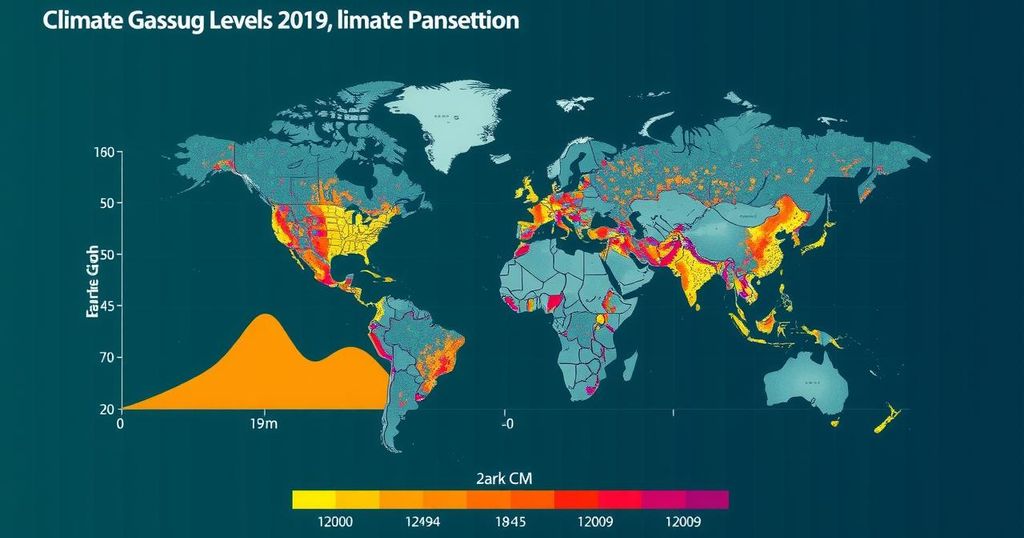Severe Wildfires Compound Greenhouse Gas Crisis Ahead of Climate Negotiations

Severe wildfires have accelerated the accumulation of greenhouse gases in the atmosphere, with current carbon dioxide levels comparable to millions of years ago. The WMO warns of dire consequences for the climate, ecosystems, and human populations ahead of the upcoming U.N. climate negotiations in Azerbaijan. The report emphasizes that the reliance on fossil fuels continues to drive temperature increases and environmental degradation.
Severe wildfires have exacerbated the rapid rise of greenhouse gases in the atmosphere, according to the recent report by the World Meteorological Organization (WMO). This alarming trend raises concerns about a potential vicious cycle of climate change as the average global temperature continues to climb. The report indicates that atmospheric carbon dioxide levels now resemble those from 2 to 3 million years ago, a period when temperatures were 3 degrees Celsius (C) higher, and sea levels were significantly elevated by 10 to 20 meters (33 to 66 feet). The WMO highlighted that emissions from fossil fuel combustion and cement production are occurring at a rate that outpaces the ability of oceans and forests to absorb them, causing these gases to persist in the atmosphere for centuries. This phenomenon contributes to the greenhouse effect, leading to an increasingly warmer climate. Ko Barrett, the deputy secretary general of the agency, emphasized, “Every fraction of a degree of temperature increase matters.” She elaborated that this increase impacts various environmental parameters, including glacial retreat speed, sea-level rise acceleration, ocean heat, and acidification. Moreover, it has dire consequences for human populations exposed to extreme heat, the extinction of various species, and the health of our ecosystems and economies. The upcoming 29th U.N. climate negotiations are set to take place in Azerbaijan, a country where an authoritarian regime governs under President Ilham Aliyev, with the national economy heavily reliant on oil and gas resources. During the 2015 climate talks, nearly 195 nations agreed to strive for a limit on the average temperature rise above preindustrial levels to 1.5 C. However, climate experts caution that the ongoing dependency on fossil fuels guarantees additional warming effects later this century. Presently, the average temperature has risen approximately 1.2 C since the preindustrial era, contributing to a sea-level rise of 24 centimeters (9.4 inches) since 1880. The WMO also noted that Canada experienced its worst wildfires, alongside severe bushfires in Australia, contributing to persistently high carbon dioxide emissions from anthropogenic and industrial activities in 2023. The bulletin warns that the transition from a three-year La Nina event to the warmer El Nino cycle in May could further decrease forest absorption of carbon dioxide, as elevated temperatures reduce plant productivity. The WMO underscored that unprecedented fossil fuel emissions over the last two decades are primarily responsible for rising greenhouse gas concentrations, which reached an average of 420 parts per million in 2023 after twelve consecutive years of increases exceeding 2 parts per million. The agency stated, “Carbon dioxide is accumulating in the atmosphere faster than at any time during human existence.” The WMO cautions that the compounding effects of rising temperatures may transform the environment into a larger source of greenhouse gases. Wildfires could release additional carbon, while warmer oceans and landscapes may absorb less, resulting in a further accumulation of these gases in the atmosphere, thereby accelerating global warming. “These climate feedbacks are critical concerns to societies worldwide,” the organization concluded.
The article discusses the ongoing crisis of greenhouse gas emissions, particularly in light of severe environmental events such as wildfires. The WMO’s findings indicate alarming levels of carbon dioxide and a potential shift in how the natural environment interacts with climate change. With imminent international climate negotiations, the urgency of addressing these issues is accentuated.
In summary, the increased levels of greenhouse gases, exacerbated by recent wildfires, highlight the critical state of the global climate crisis. The implications of rising temperatures extend far beyond mere statistics; they affect melting glaciers, rising sea levels, and existential threats to human and ecological systems. As the international community approaches the upcoming climate talks, these findings underscore the crucial need for immediate and concerted efforts to counteract climate change effects and promote sustainable practices.
Original Source: www.benarnews.org






